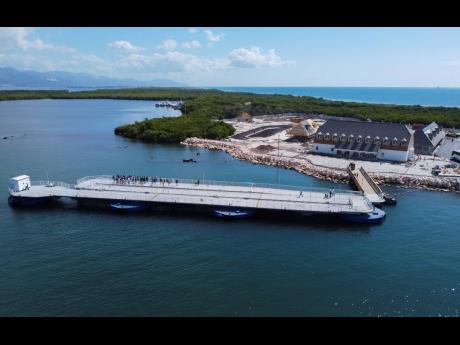Port Royal investors continue court fight despite setback
Private investors in a stalled private-public partnership to develop the town of Port Royal into a tourist attraction are fighting on in court despite a recent Supreme Court ruling that all but threw out the bid to sue the government and state...
Private investors in a stalled private-public partnership to develop the town of Port Royal into a tourist attraction are fighting on in court despite a recent Supreme Court ruling that all but threw out the bid to sue the government and state agencies that are majority partners in Port Royal Development Company, PRDC, formed 26 years ago.
In August of last year, Robert Stephens, a civil engineer and management consultant, filed an application in the commercial division of the Supreme Court for leave to bring derivative action in the name of the PRDC against the Government for breach of a memorandum of understanding, or MOU, signed in 1995 with several private sector entities that constitute the minority partners in the company.
Court documents name the minority partners as Robert Stephens, Pragma Consultants Limited, Island Car Rental Limited, Restaurant Associates Limited, The Maritime and Transport Service Limited, National Property and General Insurance Brokers, K. Chandiram Limited, Manpower and Maintenance Limited, Marvin Goodman and Associates, Fay Bangerter, representing the estate of Peter Bangerter, Helena Stephens, representing the estate of Earle Patrick Stephens, June Wallace, and Gail Cook-Johnson, representing the estate of Dr Neil Johnson.
The minority partners are said to have invested some US$10 million in the project since the signing of the agreement, which they stand to lose if the PRDC is not involved in the development project, the court documents indicate.
The matter was heard on June 23 and July 30 this year, after which Justice David Batts refused the Stephens application. Stephens was represented by Ashleigh Ximines of the law firm Knight, Junor and Samuels, while PRDC was represented by Patrick Foster QC, Alexander Williams and Oderane Kerr of Alexander Williams and Company. Affidavits were given by Urban Development Corporation and PRDC chairman Ransford Braham.
Undaunted by the ruling, the matter has been brought back on the court list as a “notice of application” and was slated for hearing by Batts on August 18 and 25. Stephens declined to comment on the new application, and referred Financial Gleaner queries to his attorneys. Ximines and the lawyers for the PRDC were not available for comment up to press time.
Batts’ initial ruling on the derivative action pointed out that the refusal had been primarily on technical grounds.
“Firstly, there was inadequate notice to the directors of the respondent as to the intended action. The notice, on which reliance is placed, does not alert to a claim against the state or its agencies for breach of the MOU or against the directors for a breach of fiduciary duties. Secondly, because the intended claim against the ‘shareholders’ and an undefined ‘secretariat’ has, for the reasons stated above, no real prospect of success and is therefore not in the interest of the respondent,” Batts said.
The judge noted that, on the evidence presented, any derivative claim contemplated ought to be against the members of the board and/or the Government of Jamaica and its agencies, for breach of fiduciary and/or contractual obligations, rather than against the PRDC shareholders and unspecified secretariat as the application was worded.
“I considered at one time, substituting the UDC for ‘the secretariat’ and giving permission for an action to be commenced for breach of fiduciary duty against that agency or its representatives on the board. However, as said earlier, the notice relied on does not articulate any such potential claim. Furthermore, the affidavits relied upon do not state that the UDC is the ‘secretariat’ to which reference is made in the application. Furthermore, it would be unfair for this court to unilaterally do so, as the applicant never sought to amend to name the UDC or anyone else,” the Batts said.
When the MOU was signed by the administration of former Prime Minister P. J. Patterson, it was contemplated as the vehicle to consult with various government agencies and undertake various development actions in Port Royal, including: restoring, upgrading, maintaining monuments and historical structures; and designing, financing and constructing a water supply and waste water disposal system.
The MOU also identified the joint venture company as being responsible for designing, financing, constructing, operating and maintaining a cruise ship pier in the town.
The government later proceeded to built a cruise ship pier as a project of the UDC and the Port Authority of Jamaica, without the involvement of the PRDC.
Braham noted in his affidavits that, following violent eruptions in Tivoli Gardens, the ability to access international financial support for the venture was adversely affected. The PRDC shareholders met and decided to put the project in abeyance until the investment climate improved. He added the UDC has since 2007 been awaiting instructions from the government as to the role and function of the PRDC in implementing the Port Royal development project.
Braham added, however, that the government had retained the right to develop Port Royal in accordance with its policy, by whatever means without recourse to the PRDC.

